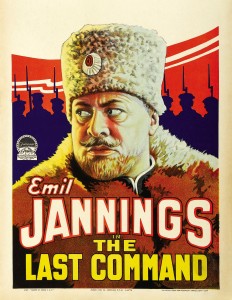 I am grateful to Robert Osborne and TCM for showing The Last Command, enabling me to revisit this exquisite, rarely shown picture, which I have not seen in two decades.
I am grateful to Robert Osborne and TCM for showing The Last Command, enabling me to revisit this exquisite, rarely shown picture, which I have not seen in two decades.
Josef von Sternberg’s silent drama revolves around an older Russian general who, exiled by the Bolshevik Revolution, makes a living as an extra in Hollywood. In an art imitates life plot, the general is asked to appear in a film that recreates the events of the Bolshevik Revolution, and descends into madness and insanity.
Well directed by von Sternberg, this film was written by John F. Goodrich and Herman J. Mankiewicz (co-scribe of Citizen Kane in 1941) from a story by Lajos Biro.
The estimable German actor Emil Jannings, best known for the 1930 The Blue Angel co-starring Marlene Dietrich, won the very first Best Actor Oscar for his performances in this film as well as in The Way of All Flesh
In Hollywood, director Leo Andreyev (William Powell) looks through photos for actors in his next movie. Spotting a picture of Sergius Alexander (Emil Jannings), Leo tells his assistant (Jack Raymond) to cast the man. Sergius shows up at the Eureka Studio with other extras and is issued a general’s uniform. Another actor complains that his head twitching is distracting, and Sergius apologizes, explaining that it’s the result of a shock he had once experienced.
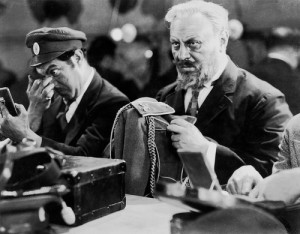 In an extended flashback, which occupies half of screen time, the story switches Russia in the midst of the Bolshevik Revolution. Grand Duke Sergius Alexander, the Czar’s cousin and army commander, is informed that two actors entertaining the troops have been identified as dangerous “revolutionists” during a passport check. He decides to toy with them for his amusement, and when Leo Andreyev becomes insolent, Sergius whips him across the face and sends him to jail.
In an extended flashback, which occupies half of screen time, the story switches Russia in the midst of the Bolshevik Revolution. Grand Duke Sergius Alexander, the Czar’s cousin and army commander, is informed that two actors entertaining the troops have been identified as dangerous “revolutionists” during a passport check. He decides to toy with them for his amusement, and when Leo Andreyev becomes insolent, Sergius whips him across the face and sends him to jail.
Leo’s companion, the beautiful Natalie Dabrova (Evelyn Brent), intrigues Sergius-despite the danger she represents, he takes her along with him. Showering her with presents, including a pearl necklace to express his love, Natalie realizes that he is a man of great honor who loves Russia as deeply as she does. When she invites him to her room, he spots a hidden gun under the pillow. Natalie draws the weapon, but cannot fire–despite political differences, she has fallen in love with him.
When the Bolsheviks capture the train on which both travel, she pretends to despise him. Instead of having him shot, like his officers, she suggests that he stoke coal into the locomotive. When everyone is drunk, however, she helps him escape, giving him back the pearl necklace to finance his way out of the country. Jumping off from the train, he watches in horror as it tumbles off a nearby bridge into the river below, killing all passengers, including Natalie.
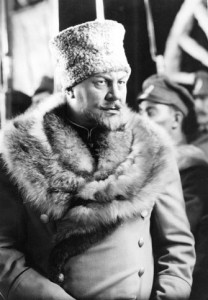 Cut to ten years later, when Sergius is reduced to poverty, living as a movie extra. When he and the director finally meet, Sergius recognizes him. In an ironic act aimed to humiliate him, Leo casts him as a Russian General in battle. He is directed to give a speech to a group of actors who play his dispirited men. One soldier tries to incite a mutiny, telling the general that “you’ve given your last command.” He whips the man in the face, just as he had once struck Leo. Losing grip on reality, he imagines himself on the battlefield, besieged by enemies, urging his men to fight for Russia.
Cut to ten years later, when Sergius is reduced to poverty, living as a movie extra. When he and the director finally meet, Sergius recognizes him. In an ironic act aimed to humiliate him, Leo casts him as a Russian General in battle. He is directed to give a speech to a group of actors who play his dispirited men. One soldier tries to incite a mutiny, telling the general that “you’ve given your last command.” He whips the man in the face, just as he had once struck Leo. Losing grip on reality, he imagines himself on the battlefield, besieged by enemies, urging his men to fight for Russia.
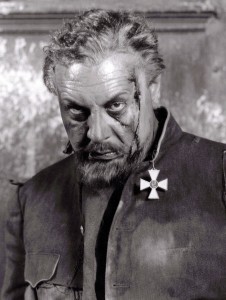 Though dying, his last wish is to know if they have won, and Leo, moved by the man, tells him that they have. An assistant remark, “That guy was a great actor,” is corrected by Leo in what becomes the film’s last line (and message), “He was more than a great actor, he was a great man.”
Though dying, his last wish is to know if they have won, and Leo, moved by the man, tells him that they have. An assistant remark, “That guy was a great actor,” is corrected by Leo in what becomes the film’s last line (and message), “He was more than a great actor, he was a great man.”
Origins of Story
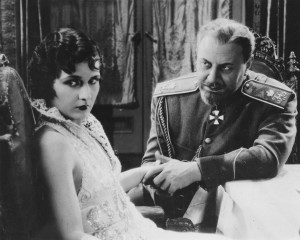 According to director Ernst Lubitsch, The Last Command was inspired by the real-life General in the Imperial Russian Army, Theodore A. Lodigensky, whom he had first met in Russia, and then again in New York, where he had opened a Russian restaurant after fleeing the Revolution. Lubitsch encountered the ex-general, when the he appeared in uniform looking for work as an extra. Under the name of Theodore Lodi, Lodigensky played several roles in the early 1930s, including the Grand Duke Michael, a Russian exile forced to work as a hotel doorman in the 1932 Down to Earth.
According to director Ernst Lubitsch, The Last Command was inspired by the real-life General in the Imperial Russian Army, Theodore A. Lodigensky, whom he had first met in Russia, and then again in New York, where he had opened a Russian restaurant after fleeing the Revolution. Lubitsch encountered the ex-general, when the he appeared in uniform looking for work as an extra. Under the name of Theodore Lodi, Lodigensky played several roles in the early 1930s, including the Grand Duke Michael, a Russian exile forced to work as a hotel doorman in the 1932 Down to Earth.
Oscar Context
Oscar nominations: 3
Picture: Paramount Famous Lasky
Actor: Emil Jannings
Original Story: Lajos Biro
Awards: 1
Actor (for two different roles)
Cast
Emil Jannings as Grand Duke Sergius Alexander
Evelyn Brent as Natalie Dabrova
William Powell as Leo Andreyev
Jack Raymond as the Assistant
Nicholas Soussanin as the Adjutant
Michael Visaroff as the Bodyguard
Fritz Feld plays a screaming revolutionary who at one point sneers in Jannings’ face.
Film Status
In 2006, the film was deemed “culturally, historically, or aesthetically significant” and was selected for preservation in the National Film Registry.
In 2010, Criterion released a DVD set of three von Sternberg films: The Last Command, Underworld, and The Docks of New York.
End Note
German actor Emil Jannings, later a Nazi collaborator, became the first winner of the Best Actor Oscar, when he was singled out for this as well as his role in “The Way of All Flesh.” However, the coming of sound cut his career short and he returned to Germany before the Oscar ceremonies, in May 1929.
Jannings is best-known for his role as the professor in “The Blue Angel” (1930), the film that made Marlene Dietrich an international star.
Reportedly when the Allied Forces invade Germany and Jannings, a supporter of Hitler, was found and investigated, the first thing he showed was his Oscar statuette. He died in 1950.




Speak Your Mind